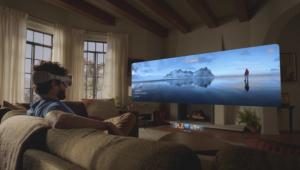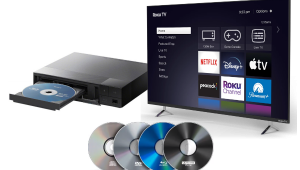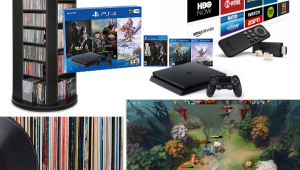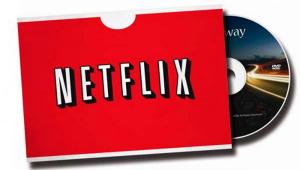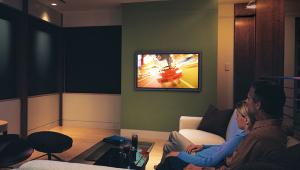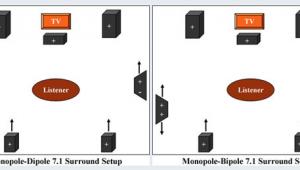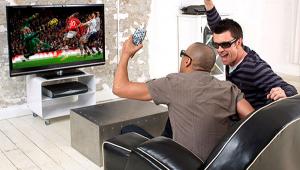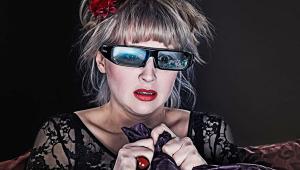I really wish you guys would run a piece on display calibrators like the X-Rite and CALMAN software(or any other you think works the BEST). At about $495.00-600.00 or so, and with the supposed ability to help calibrate gray scale and gamma values, I believe it may represent a great deal for the motivated enthusiast consumer. Of particular interest to me is the fact that one could recalibrate, say a projector for example, as the lamp dims with age. I know your magazine prefers to recommend ISF trained calibrators but some of us live in remote or unstable areas making it difficult to get a calibrator out to our homes. Not to mention that it may take SEVERAL days to nail down the best possible performance out of the projector... a fact that has been mentioned by your reviewers on more than one occasion. So, how about it HT.. will you give us a review or just give us your qualified opinion on whether these economical colorimeters and/or spectrometers can actually give us a better result that just eyeballing it with a calibration DVD? Can we achieve near-professional results with these devices given enough time and dedication?
Primary tabs
Is Your Display Fully Calibrated?
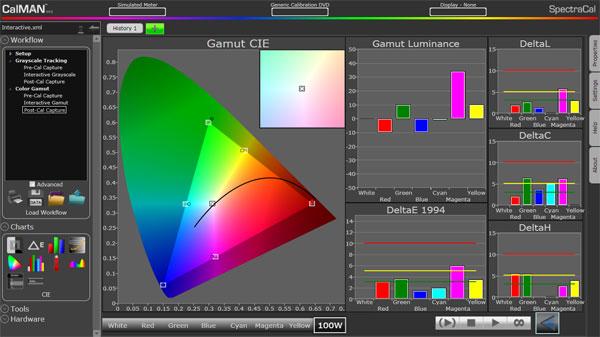
This typically gets you relatively close to the display's best performance, but to get even closer, you must calibrate the display's grayscale and color gamut if the necessary controls are available in the menu system. You can hire a professional to perform the calibration at a cost of several hundred dollars, or you can do it yourself if you have the required equipment, software, and training, which can cost thousands of dollars. But for those of us who want to wring every last drop of performance from our displays, it's money well spent.
Have you had your display's grayscale and color gamut fully calibrated? If so, did you hire a pro to do it, or did you do it yourself? If not, why not?
Vote to see the results and leave a comment about your choice.
- Log in or register to post comments


My old Colorvision Spyder 2 Pro colorimeter still works even though it's many years old. It can calibrate just about every type of display out there including front projection systems, but the colorimeter was built before LED TV's came out so I'm not sure how well it will do with those. The problem is that most TV's don't have grayscale controls in the user menu so even if you have the proper equipment you won't be able to do the calibration yourself.

The issue with the Spyder 2, or any other similar tri-stimulus meter, is that the filters in them all degrade and drift over time. When it was new, it was likely +/- 1.5 dE or so for accuracy, but by now it would be way off that. I have a 3 year old i1Display2 that I've keep as isolated from elements as possible, but decided to compare it to the results from an NIST certified i1Pro spectrometer for grayscale. While the i1D2 thought it was dead accurate (1.2 was the largest grayscale dE, using dE 1976), the i1Pro showed it was actually between 12-14 dE at every point.
They also tend to have issues with LEDs and any wavelength of light other than CCFL lamps. This is why it is so expensive for the real professionals, since you can have to invest $10,000+ in a true reference spectrometer, $5,000 in a tristimulus meter like the Klein (which uses glass filters and not plastic, and is sealed, so it doesn't degrade over time), and then pay for getting them certified all the time to be certain they are accurate. You can do a very good job for less, but any tristimulus meter more than a couple years old is going to be very unreliable, no matter what numbers it gives you.
Most TVs now have grayscale controls in the user menu, and in all the sets and projectors I've seen recently, only one didn't have at least a two point control (and it had a 1-point control that managed decent results). Older displays often did not, but that hasn't been the case for a few years now it seems.

I'd love to get my TV fully calibrated some time, but I broke the bank on the TV itself (a Sony XBR-55HX929) so... I've got it close using Tom's posted settings and the DVE bluray. That's good enough for now. Besides, I live in a smallish 1 bedroom city apartment, which doesn't give me the room (or wife's permission...) to create that perfect home theater environment (e.g., neutral gray walls, really good light control), so I'm not sure I'd benefit from the additional 15% picture quality improvement that paying for full calibration would bring. But some day, I hope!

First of all, I'm a bit shocked at the amount of the Hometheater enthusiasts that havn't calibrated their display! You may hear some say,I had my TV calibrated and it was a waist of money. I don't see any difference. Well,on a small cheap display it may not make a big slash but depending on the input source and other factors,it made a difference.(Sunrise),you have a nice TV! $3500.00! Most of the readers don't have a display that nice.Believe me, 10% of what you paid for it is worth the calibration. If your like the rest of us, YOU LOVE THAT TV AND WOULD PROTECT IT WITH YOUR LIFE! Start with your environment,make some changes. Welcome that TV in to your apartment with open arms. Ask your landlord if you can paint the apartment something besides white!(flat or eggshell)Go to IKEA find curtains,dimmable bulbs.Your wife will think that you lost your mind,but they love to go shopping! Now that you have this new room, it's time to come up with the money and give that 2nd love of your life a tune up. The calibration can be ajusted for any environment but you can see what I am saying. Once its done and you have both night and day settings for blue ray and your tv programming your done! no more guessing and no more ajusting every 5 mins.You can do it! Good Luck!

I recently bought a Panasonic 65" GT-series plasma TV and a Spears and Munsil calibration blu ray disc. I sat down to calibrate the TV using the disc and it was like trying to read a foreign language. One of these days I'm going to have to swallow my pride and hire a professional who actually knows how to use the disc.


After using my plasma tv for almost a year, the color shifted to green (blacks were just a dark shade of green). Thanks to the service manual from the web, I was able to perform a basic (I'd like to think so) calibration using THX optmizer, and now the PQ is better and the color is fairly accurate.

I used a professional calibrator (Tom Huffman, creator of ChromaPure) to calibrate my JVC RS45 + Lumagen Radiance 3d Video Processor. It's a great combination. What's amazing is, When I switch between the calibrated and uncalibrated radiance input, the difference is staggering. Truly. Whether you pay or do it yourself (likely the best option in the long run, as lamp brightness changes), calibration should just be considered an added cost to any display and done immediately after purchase (or after 100 hrs with projectors).
If anybody's interested in seeing the calibration results, feel free to check them out here: http://www.avsforum.com/t/1316583/brolicbeasts-living-room-theater/540#p...

My Pioneer Kuro 5020 is professionally calibrated but my Panasonic 55 ST30 was setup by myself using the Digital Video Essentials: HD Basics Bluray.

I thought about having my TV ISF calibrated for two TVs, a Pioneer Elite CRT rear projector, then a Mitsubishi Diamond DLP, but never did it... and then bought a Pioneer Elite Plasma. The nearest ISF calibrator lived 100 miles away. I finally bit the bullet and had him travel to have my TV done after having it a year with 2500 hrs. on it. I had calibrated it myself with DVE and Spears and Munsil discs, but it was so much better after the ISF calibration I regret waiting so long. The shadow detail was much better and all the colors seemed more natural. I did ask if he had done many calibrations, he had. and...what kind of experience he had with my model TV?..about 40!, including his own, which was the same model. It is worth the money. I admit I can't stand most TVs after having mine calibrated, everything seems cartoonish.

I have a 60" Pioneer Elite Pro 141 Monitor and I would have sold body parts to get it calibrated! It looked great out of the box but after calibration.....WOW ! The hardest part was after the purchase I had to wait for.. I think 100 hrs to break in. I could never tell my wife how much the tv or the calibration cost.Like the song (I wish I had Jarod's girl)! Where can I find a woman like that! Jarod,did you make it to the Atmos theater? How was it? I hope everybody has a fun and safe 4th

Nice one true audio! Ya we made the trip and had a blast! Atmos was incredible and if you want I left a review of it at the blog where Scott asked us if we are going to see Brave in Atmos. It's a page back now I believe. Have a happy 4th bro!

I'm sure the vast majority who answered "No" also own Avia, DVE, or some other such calibration disc. $20-$30 is an investment that most non-Mitt-Romney videophiles can justify to themselves, while several hundred dollars just isn't, especially when many technologies drift away from perfect calibration over time.
I have DVE as well as the AVS HD 709 suite. I pop them in every year or so to ensure "good enough" settings. I get the blue eye filter out and check the color, too. But several hundred bucks just isn't in the cards on my budget.
I'd be interested to see a well-researched piece really comparing the results achieved by calibration discs vs. professional ISF calibration with full colorimeter rig.

Just look at most display or projector reviews to see what a calibration can do. The pre-calibration settings for most reviews are what can be done by eye with a test disc, and the post-calibration results are what are done with instruments and software. The amount of change will be dependent on the amount of controls available to you and how accurate it was to start with.
Also, outside of projectors most displays don't shift significantly after the first 200 hours or so. If you have a bulb that ages than your image will shift as it ages, but if you have a plasma or LCD display, you can have it calibrated and not see much of an image shift for a long time.

I believe wholeheartedly that the difference between the settings arrived at by a calibration disc and a full calibration can be displayed on a chart. As you say, it is obvious by looking at the charts and graphs provided by reputable review sites. What I question is that the difference to the eye is great enough to justify the cost - and since apparently it needs to be measured by $10,000 equipment, I really wonder whether it is.
I just wonder how much post-spending justification is going on, and how much is really discernible to the average, or even educated viewer. I'd like to see a double-blind test of calibrated and non-calibrated displays to see whether people can really tell the difference when they don't know which set has had hundreds of extra dollars spent on it.
And I say this as someone who has not had his display calibrated, nor has ever *seen* a calibrated display, and is fully willing to believe that there is some sort of appreciable difference. I just never hear anyone without a calibrated set extol the virtues of calibration, and say they just wish they could have afforded it, because it really is that much better. All I hear is people who have spent the money justifying their expenditure.
Would you trust a die-hard Ford or Chevy fan to give you a review of a Ford or Chevy vehicle? I wouldn't. I want more information. I want side-by-side comparisons. I want science, not gushing opinions.
